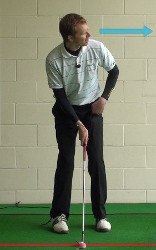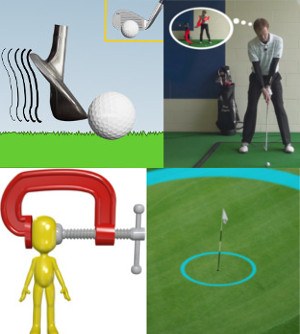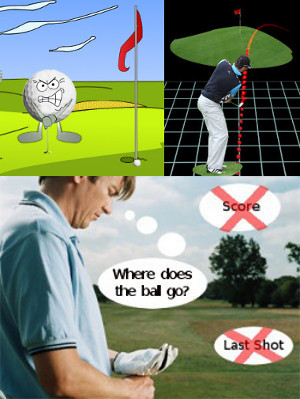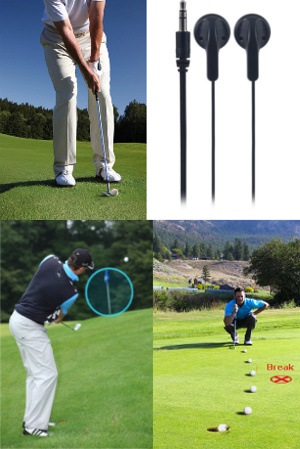To hit the ball just the right distance, you need a more target-oriented approach. Instead of looking at the ground, focus on the spot where you want the ball to land as you make practice swings, rehearsing the length and force with which you need to hit the ball to put it there. At address, focus again on your target spot and waggle the club lightly a few times. Then return your eyes to the ball and play the shot.

If you watch any of today’s leading Tour players, they all focus extremely well on the target and this ability helps them to shoot some amazingly low scores by preventing them from getting distracted away from the task that they are facing, namely getting the ball as close to the target as possible.
When you think of the various skills you need to play the game of golf successfully, what comes to mind? You probably think about having solid technique, a good touch on and around the greens, and maybe the creativity to come up with unique shots when you are in tough situations. Those attributes are all helpful, but what about focus? To be sure, focus is something that is in high demand on the golf course, and developing your ability to focus should be high on your golf priority list.
In this article, we are going to talk about focus in golf. We’ll talk about why focus is important, how to evaluate your current ability to focus, and much more. Don’t make the mistake that so many other golfers have made in thinking that focus is not as important as other golf skills. Sure, you need those other skills as well, but they won’t take you far if you can’t focus properly on the task at hand.
All of the content below is based on a right-handed golfer. If you happen to play left-handed, please take a moment to reverse the directions as necessary.
| GOLF FIXES BY PGA PROS |
|---|
| Focus on the Process for Best Short Putt Results | Video | Article |
| Beginner Golf Tip – Focus On The Target In Short Game | Video | Article |
| Control Focus to Hole Short Putts Senior Putting Tip | Video | Article |
| Focus On The Target Not The Golf Ball To Enhance Feel | Video | Article |
| Focus On Your Fundamentals To Keep Your Head Stable In The Golf Swing | Video | Article |
| Focus on Target, Not Ball, to Enhance Feel, Golf | Video | Article |
| How to Focus on Target when playing Golf Shots Golf Tips | Video | Article |
| LESSONS |
|---|
| Better Rhythm To Improve Your Topped Golf Shots | Video | Article |
| Mental Tip – Behind the Ball Focus | Video | Article |
| Choosing Which Big Muscles To Focus On During The Golf Swing | Video | Article |
| Focus On Your Hands To Solve The Problem Of Poor Shaft Angle In Your Golf Swing | Video | Article |
| The Best way for Senior Golfers to Focus on Target | Video | Article |
| Focus On Golf Swing Tempo | Video | Article |
| YOUR GRIP |
|---|
| How Tight To Grip A Golf Club, What Should I Focus On? | Video | Article |
| PRACTICE DRILLS |
|---|
| Perfect Focus For Chipping With This Back Yard Umbrella Drill | Video | Article |
| Golf Drill Tip: Stop pulling – Focus on high finish | Video | Article |
| GOLF QUESTIONS |
|---|
| What Should I Focus On When Placing My Feet In My Golf Stance? | Video | Article |
| What Should I Focus On To Stop Topping The Golf Ball? | Video | Article |
| What Things Can I Do To Help Me Focus Better On The Golf Course? | Video | Article |
| Water Hazards, What Should I Focus On When Playing A Golf Shot Over Water? | Video | Article |
| What Should I Focus On At Impact For More Accurate Golf Putts | Video | Article |
| What Should I Focus On During My Down Stroke For More Accurate Golf Putts | Video | Article |
| What Should I Focus On During My Follow Through For More Accurate Golf Putts | Video | Article |
| What Should I Focus On During My Pre Shot Golf Putting Routine | Video | Article |
| What Should I Focus On To Create Perfect Hip Rotation In My Golf Swing? | Video | Article |
| How Can I improve My Feel Focus on target not ball? | Video | Article |
| What Should I Focus On To Improve My Ball Striking? | Video | Article |
| What Should I Focus On To Start My Backswing During My Golf Putting Stroke | Video | Article |
— How Focus Helps You Play Better Golf
Technical skill alone is not enough to play great golf. To be sure, developing your technical skills can be a tremendous help, but if you think that alone will be enough to allow you to reach your goals, you are sadly mistaken. There is a lot that goes into producing a good golf score, and technical skill is only the start. Once you start to work on your focus, you will quickly notice just how powerful this piece of the puzzle can be. Master your ability to focus on the links and it’s almost inevitable that your scores will come down.
How is focus going to help you record lower scores? Let’s take a closer look.

- Avoid mindless errors. It’s easy to make silly mistakes on the golf course if you aren’t focused. A perfect example of a mindless error is using a different club than the one you intended. For instance, you may arrive at your ball in the fairway and decide that you are going to hit a seven iron – only you actually pull an eight iron from your bag and don’t notice before making a swing. These clubs are similar, so it’s possible that you wouldn’t notice the difference, especially if you don’t play often enough to have a good feel for all of your clubs. So, you wind up hitting the shot with the wrong club, and it inevitably falls short of the target. This kind of mistake can be completely eliminated from your game if you are willing to focus on the task at hand for all 18 holes.
- Keep your swing thoughts in mind. Have you ever worked something out on the range that seemed to get your swing in a good place, only to forget about that little tip as soon as your round starts? That is a common experience for golfers, and it is another issue that can be avoided if you focus. It does need to be said that you shouldn’t be focused on too many different things at one time while on the course. It’s best to limit your swing thoughts to just one or two keys that can keep you on track. If you keep it simple and consistently remind yourself of those same points as you go through each round, you should be able to reduce the number of poor shots you hit. No one in this game, not even the top pros, can produce good swings on every single shot, but staying focused and remembering what you are trying to do with the club should certainly help.
- Evaluate every situation. There is a lot of preparation to do in golf before you hit any shot. For a full swing shot, you need to figure out what club you are going to use, what kind of shot you are going to play, where you’ll aim, etc. You will also need to check on the lie of the ball to make sure it will be possible to hit the kind of shot you have envisioned. In other words, there is plenty of work to be done, but only a focused golfer will actually do that work. If your mind is wandering and you aren’t focused on the task at hand, you may wind up just walking up to the ball and making an aimless swing. As you might imagine, aimless swings rarely lead to positive results. Keep your mind focused as you prepare for each shot, so you don’t miss key pieces of information that could have helped you hit the target.
- Manage pressure. No matter what kind of golfer you are, pressure plays a role in this game. For competitive players who regularly enter tournaments, the pressure comes from trying to beat the others in the field. However, even if you never enter a competition and often play alone, you’ll still feel pressure to hit good shots and beat your own personal records. To deal with pressure successfully and play well even when nervous, you need to be focused. Without a strong level of focus in your game, you’ll inevitably let your mind center on the pressure rather than the task at hand. Even focused golfers are going to feel pressure, but they should be better able to deal with it in a productive manner. If you have a history of struggling to play well when you are nervous, try working on your focus as a powerful way to get over this hurdle.
We can’t list all of the various ways improving your focus can help your play, because that list would just keep going and going. It’s enough to know that strong focus is an essential piece of the golf puzzle, and you’ll be a better golfer if you have the ability to keep your mind centered on the task at hand.
— Is Focus a Problem for You?
Focus can be harder to evaluate than some of the other parts of your game. For instance, if you keep slicing your tee shots into the trees, you don’t have to wonder if your driver is causing problems – you can see that it is, without any doubt. Focus issues, on the other hand, are not so obvious. You may wonder from time to time if a lack of focus is getting you into trouble on the course, but making this determination will always be somewhat subjective.
To help you determine whether or not poor focus is something that is holding you back, we have highlighted some signs below that may point to a focus problem.

- Poor performance on easy shots. This is a classic sign that a golfer is not properly focused during a round of golf. If you find yourself wasting strokes by making mistakes on easy shots, it’s safe to say that you aren’t fully focused on the task at hand. A perfect example of this issue is missing short putts. Every golfer will miss one occasionally – it’s just part of the game – but consistently missing short ones can point to weak focus (unless your technique is badly flawed). No matter what kind of shot you are facing, do your best to remain focused and go through a pre-shot routine each time. The comfort of that routine, and the focus it allows you to achieve, will be tremendously helpful in cutting out the simple and silly mistakes from your game.
- Struggles late in your rounds. Another common sign of lacking focus is poor play late in a round. If you tend to start strong and tail off as the day goes along, you might not be focused sufficiently on what you are doing. Of course, it’s also possible that you are getting physically tired later in the round, so think about how your rounds usually play out and decide whether it is a mental or physical problem that is giving you trouble. Later in the article, we will highlight a method that you can use to keep your mind fresh so it’s easy to focus on your shots for all 18 holes.
- Often feeling indecisive. There are a lot of decisions to make during an average round of golf, and it’s natural that you will feel indecisive from time to time. While feeling like you can’t make a clear choice is okay once or twice in a round, this should not be a regular occurrence. If you consistently can’t make up your mind and can’t commit yourself to a specific plan for the shot you face, poor focus is likely to blame. A focused golfer tends to be able to sort through the options available before selecting one and executing the shot. As your focus improves, so too should your ability to pick a specific shot and commit to it completely before making your swing.
- Trouble remembering details from your round. Golfers are generally quite adept at recalling very specific details from their rounds. For instance, they might be able to tell you what yardage they had in for their approach shot on #7, or which two clubs they were stuck between on #12. Whatever the case may be, many golfers are able to go into great detail regarding the specifics of their rounds. If you can’t do that, it may be because you aren’t particularly focused on your play. By not paying close attention in the moment, you won’t end up with the kind of recall ability that many other golfers possess. While it’s not particularly important to remember such details, the fact that you can’t may reveal an issue with the way you approach your rounds.
If you are struggling to focus on the golf course, you probably know deep down that something is wrong with your approach to the game. You might not feel ‘locked in’ for the majority of your rounds, and you may find yourself second-guessing your shots after they have been hit. By putting in the effort to improve your performance in the area of focus, you might be surprised to find how quickly strokes can drop off of your scorecard.
— Finding Focus in Practice
As with everything in golf, and pretty much everything in life, you are going to need to practice if you want to improve in this area. You can work on your focus on the driving range just as you can work on any of your other skills. Of course, this isn’t going to happen by accident – you’ll need a plan for how you are going to work on your focus while at the driving range and on the practice putting green. In the points below, we have offered some advice that should help you improve your focus significantly through practice.

- Play a full round. Rather than just standing on the tee line making one swing after the next, try ‘playing a round’ as you hit your bucket of balls. What does that mean? Simple – you imagine that you are playing your favorite course, and you hit the shots that you would expect to hit on that course, in the proper order. So, if the first hole is a driver hole for you, hit a driver to start your round. Based on how you hit that driver, estimate what club you would need to hit for the next shot and proceed. In this drill, you will skip the short game shots. By the time you are done with this imaginary round of 18 holes, you will have hit many of the clubs in your bag and you will have had to focus on the task at hand. This is a great practice method for any golfer, but it is particularly valuable for players who struggle with focus problems.
- Use some headphones. On the driving range, unlike on the golf course, there can be a lot of chatter. If you are practicing on a busy Saturday afternoon, for instance, there may be a line of people up and down the range – and many of them will be talking. To take away some of the distractions that can come with a range full of golfers, consider wearing headphones as you practice. Turn on some music that you enjoy and get to work on improving your game. This is a simple step, but it may help you to actually focus on what you are doing, rather than being distracted by those around you.
- Pick specific targets. It’s easy to fall into the habit of just hitting your practice shots somewhere out onto the range – after all, it’s a big open space, so you probably don’t feel like you need to be too specific. But that’s going to change on the golf course, as you face narrow fairways and small greens, so you might as well work on being as accurate as possible while you practice. For each shot you hit during a range session, focus on a specific target and do your best to hit that target. And, if possible, switch up targets frequently, as this will better mimic what you are forced to do on the course. Not only will the act of trying to hit specific targets help your game translate more effectively to the course, but the effort required to practice this way will sharpen your focus considerably.
- A putting plan. Not only do some golfers wander through their practice sessions on the range, but those same players will often mindlessly work their way through some time on the putting green. It’s just as important to focus when practicing your putting as it is when working on your full swing. Before you drop a ball onto the practice green to get started, take a moment to come up with a plan for what you will do with your practice time. It’s a good idea to roughly divide your time in half between short putts and long putts, so start there and then get more specific. For instance, while working on short putts, you might decide that you want to make 10 three-footers in a row before moving on to the next drill. As you gain experience with putting practice, you will likely develop a routine that will help you greatly moving forward.
A golfer who is focused during practice is far more likely to be a focused player on the course. You don’t have to be locked in during practice to the point where you aren’t even having fun, but you should be focused enough to get meaningful results.
— A Social Solution
The game of golf is challenging for countless reasons. For starters, it’s a hard game, requiring the player to hit the ball hundreds of yards in the air while aiming for small targets. In addition to the physical challenge, the game itself requires significant focus, as we have been discussing in this article. But here’s why that’s a problem – it usually takes more than four hours to play! It’s hard to focus on anything for that length of time, which is why so many golfers find themselves struggling to focus for a full round’s worth of shots.
To get around this problem, you need to have a plan for when you are going to focus, and when you are going to let your mind wander. If you try to focus exclusively on your golf game for more than four hours, you’ll probably be burned out before you even get halfway through. So, for most players, the best approach is to move in and out of focus as the round progresses.

The idea here is that you will focus intently when you are getting ready to hit a shot, and while you are hitting the shot, and you will allow yourself to talk and think about other things the rest of the time. This is a ‘social solution’ because it permits you to talk and have fun with your playing partners while still working toward a good score. There is plenty of downtime during a round of golf, such as when you are waiting for the group in front to finish, and you can use that time to have fun with those you are playing with. Then, when the coast is clear and it’s time to hit a shot, you can get down to business and make a clear decision that leads to a solid swing.
We should point out that it will take a while to learn this golf rhythm. Experienced players tend to naturally come in and out of focus at the right times, and they don’t even have to think much about it. For those who don’t have as much experience on the course, it’s more important to be intentional with focus. You’ll need to tell yourself that it’s time to focus and kick start your pre-shot routine. When that shot is finished, you can pick up a conversation that you might have dropped a few moments earlier. It might be a little forced at the start, but this approach to focus is very common in the golf world, and should make you a better player when all is said and done. If you are able to come away with a focus plan that allows you to both have fun and play well, it will be a win all the way around.
Improving your focus on the golf course is just like improving anything else in this game – you should expect it to take time. You aren’t going to go from poor, inconsistent focus to perfect focus from one round to the next. Instead, you should gradually improve, noticing where and when your focus drifts away so you can catch yourself next time and keep your mind on the task at hand. We hope the information we have provided in this article will help you dial in your focus better than ever before in upcoming rounds. Good luck!






